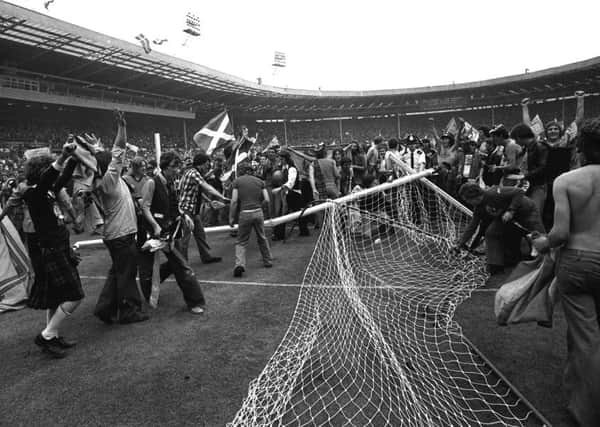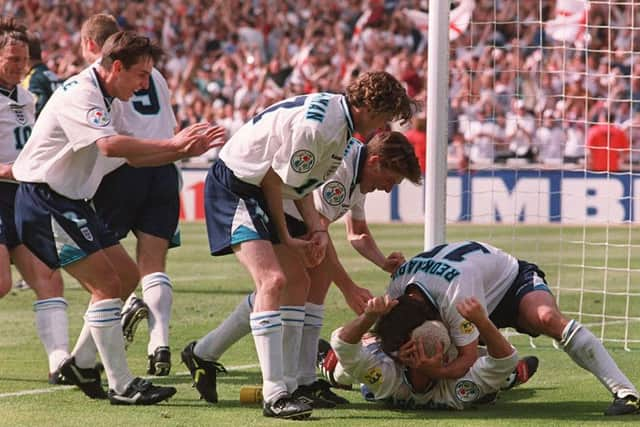Bygones: England v Scotland '“ When Gordon Strachan pitched in to celebrate famous Wembley win


Be it Euro ’96 and ‘that’ goal by Gazza or the day Scotland triumphed 3-2 at Wembley almost 30 years earlier to crown themselves unofficial world champions, clashes between these neighbours have thrown up countless memorable moments.
A capacity Wembley crowd will be hoping for more of the same on Friday night when Gordon Strachan’s Scotland will head south for a fixture that is likely to go a long way towards deciding the future of not just the former Leeds United captain but also that of Gareth Southgate.
Advertisement
Hide AdAdvertisement
Hide AdNo quarter will be asked nor given between two teams who, while down on their luck right now, will strain every sinew to get one over their biggest rival.


It promises to be a cracker but, no matter how the 90 minutes play out, what surely can not happen is a repeat of perhaps the most infamous meeting of these best of enemies.
That came almost 40 years ago. Wembley was again the venue, albeit one sporting the Twin Towers and not the Arch that today lights up the North London skyline.
It was the sixth and decisive fixture in the 1977 Home Championships. At a time when two points were awarded for a win, Scotland trailed leaders Wales by a point but boasted a superior goal difference. Victory for either side would mean finishing top.
Advertisement
Hide AdAdvertisement
Hide AdDon Revie had been in charge of the hosts for a little under three years, but things were turning sour with the Three Lions looking destined to miss out on the following year’s World Cup finals.


Scotland, in contrast, were riding high on a wave of expectation fuelled by the infectious optimism of new manager Ally MacLeod and a host of players who would have walked into most international teams.
Kenny Dalglish, Graeme Souness and Joe Jordan were just three of the star names that, the following year, would fly out to the World Cup with the Tartan Army believing their time as a footballing superpower had finally arrived.
As it turned out, ignominy and not immortality lay in store for MacLeod and his players in Argentina thanks to a defeat against Peru and a draw with Iran. But, on June 3, 1977, none of the estimated 70,000 fans who descended on Wembley from north of the Border knew that – hence the palpable air of excitement.
Advertisement
Hide AdAdvertisement
Hide AdEven on the team bus inching its way through the crowds to Wembley, the players could feel it.
So, too, could the English squad, who on making their own way to the stadium were ‘treated’ to the sight of countless kilts being lifted to reveal what a Scotsman truly keeps underneath.
Two years earlier, England had thumped Scotland 5-1. A burning desire for revenge had been apparent from the moment Revie and his players had arrived in Glasgow for the 1976 Home Championships meeting.
Revie’s pre-match assertion that this was the best Scotland side he had seen in 10 years was contemptuously dismissed by his managerial counterpart, Willie Ormond. “Your mother made a mistake at your Christening,” he barked. “You’re Con Revie, not Don Revie’.
Advertisement
Hide AdAdvertisement
Hide AdThe merciless jeering of God Save the Queen ahead of kick-off further underlined the antipathy towards the visitors, who despite going ahead through Mick Channon went on to lose 2-1 after a tame shot from Dalglish somehow crept under the body of Ray Clemence.
A year on and Scotland, well placed in their own World Cup qualifying campaign, were confident of adding to the woes of Revie, who since that loss at Hampden Park had endured a chastening 2-0 home loss to Holland and Wales’ first triumph at Wembley in 42 years.
Revie, therefore, needed the type of lift that comes with beating the Auld Enemy. He did not get it, with Scotland – roared on by what is still believed to be the largest travelling army of fans for an international game – over-running the hosts in a similar manner to what the Tartan Army did to Trafalgar Square throughout that weekend.
Gordon McQueen opened the scoring four minutes before half-time, the former Leeds defender rising high above a scrum of bodies to meet Asa Hartford’s floated free-kick with a downward header that gave Clemence no chance in the home goal.
Advertisement
Hide AdAdvertisement
Hide AdScotland doubled their advantage just after the hour mark when Dalglish fired in the rebound after his initial shot had been blocked.
Mick Channon pulled a goal back for England from the penalty spot three minutes from time, but anything but a first Scotland victory at Wembley in 10 years would have been a travesty.
McQueen, signed by Revie for Leeds and a key member of the title-winning side of 1974-75, recalls: “Afterwards, Don came over and we had a chat. He joked, ‘What are you doing to me?’ He was under pressure because results had not been great but there was no malice on his part.
“We also spoke after the 1975 game (England’s 5-1 win) and he told me to stay positive despite the result. That was Don all over, taking time to make sure one of his Leeds players was okay.”
Advertisement
Hide AdAdvertisement
Hide AdThe final whistle blowing at Wembley was the cue for what, even allowing for such a dominant display from MacLeod’s men, really made the 1977 meeting of football’s oldest rivalry so infamous.
Thousands of joyous Scots, taking advantage of Wembley not being due to erect fences until the start of the following season, poured on to the pitch.
Soon, the crossbar at one end of the stadium had given way under the sheer weight of bodies hanging off it and when the hordes were finally cleared there were huge clumps of turf missing, destined, no doubt, to be replanted in gardens across Scotland.
One man who did exactly that was Strachan, in London that weekend on honeymoon and at the game with wife Lesley.
Advertisement
Hide AdAdvertisement
Hide Ad“Do I feel red-faced about it?” said the current Scotland manager about invading the pitch in 1977. “Not at all.
“My wife and my best man were with me on the terraces and we were the only ones in that section still standing there. A policeman said to us, ‘Do me a favour and get on the pitch as you look silly standing there on your own’.
“So, we just joined in. I was only a boy then, 20 years old. I was glad to be on the pitch. I didn’t wreck anything. Did I swing from the crossbar? I couldn’t reach it.
“But there is a bit of turf in the garden of a house in Broughty Ferry (near Dundee) from Wembley.”